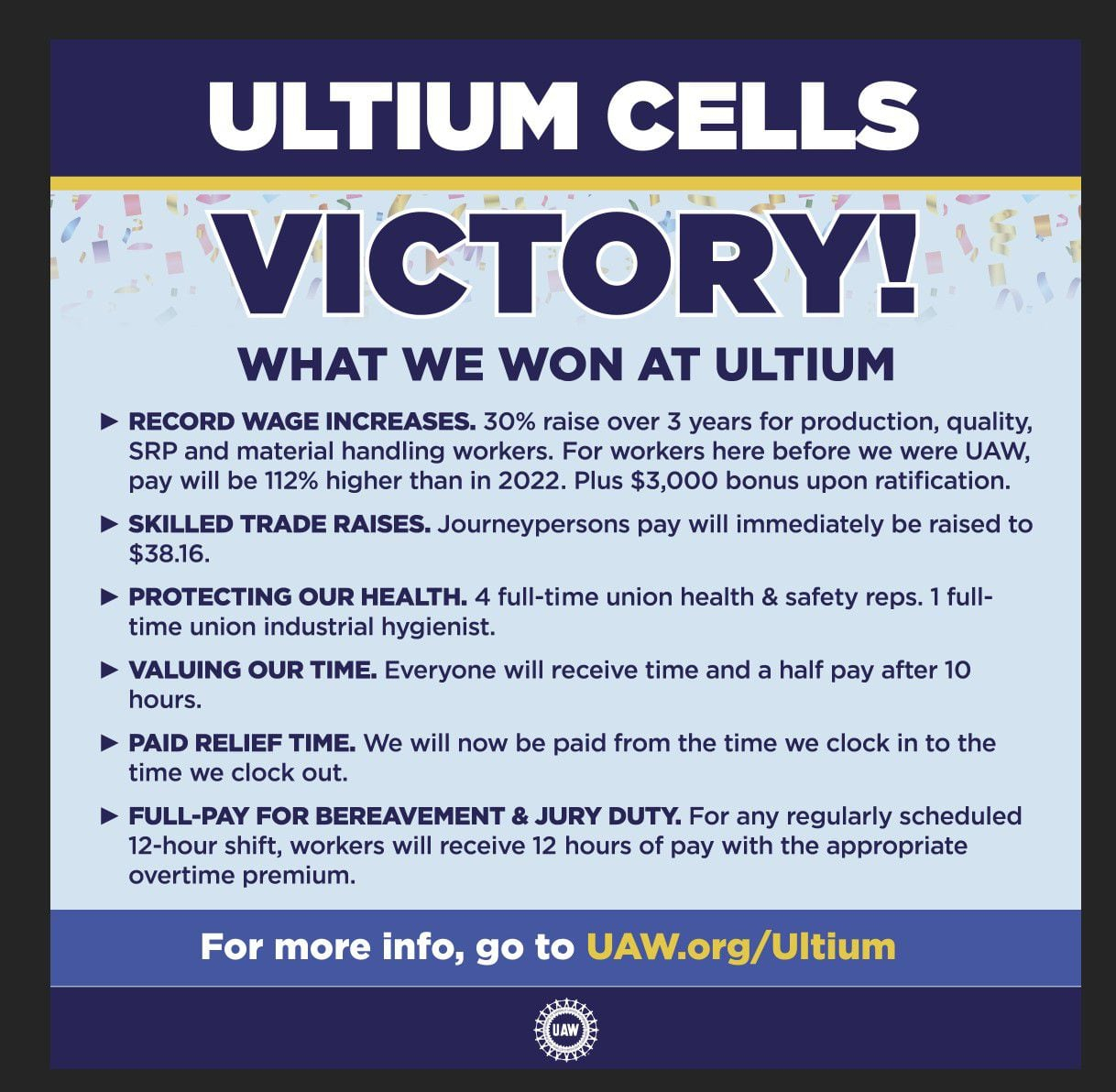LG-GM joint venture workers win 30% wage hike

A celebratory announcement from the United Auto Workers detailing the gains from a tentative labor agreement at Ultium Cells, including a 30 percent wage increase over three years (United Auto Workers)
LG Energy Solution and General Motors' joint venture, Ultium Cells, have tentatively agreed to a 30 percent wage increase over the next three years, significantly boosting worker pay amidst concerns about rising production costs.
The United Auto Workers announced Monday that their local chapter at the Ultium Cells plant in Warren, Ohio, has reached a preliminary agreement with the company. This tentative deal still requires ratification by union members.
UAW President Shawn Fain stated that the agreement would raise the starting wage to $26.91 an hour, a significant jump from $16.50 last year and $20 after a company-initiated increase in August.
According to the union, wages will climb to $35 an hour after one year on the job by the end of the agreement. Additionally, the deal includes a 30 percent wage increase over three years for many workers along with a $3,000 ratification bonus.
The Warren, Ohio, plant workers joined the UAW in December 2022, shortly after the facility commenced operations, and have been actively seeking higher wages since. This effort led to an interim wage agreement last August, providing a 25 percent wage increase.
The latest negotiations have been influenced by the broader labor discussions between General Motors and the UAW, which concluded following a major strike involving the three largest US automakers last November.
LG Energy Solution and General Motors formed the Ultium Cells joint venture to supply batteries for GM's electric vehicle lineup. This collaboration aims to secure a reliable domestic supply chain for GM, reduce dependency on international suppliers and foster technological innovation by combining LG's expertise in battery technology with GM's extensive automotive manufacturing capabilities.
The Warren, Ohio, facility, operating since late 2022, is the first of three plants planned in the US. A second plant in Tennessee began full-scale production in April, and a third facility in Michigan is under construction, with operations expected to start next year.
The joint venture’s wage negotiations occur against a backdrop of increasing concern within the US battery industry about rising domestic production costs. While the Inflation Reduction Act has provided temporary relief through subsidies, there is ongoing industry discourse regarding the long-term impact of elevated labor costs on the operational efficiency and global competitiveness of US battery manufacturers.
"The industry fears a potential domino effect where rising costs could erode the financial benefits currently offset by governmental incentives," said an industry insider familiar with the matter.
By Moon Joon-hyun (mjh@heraldcorp.com)
EDITOR'S PICKS
- HS Hyosung to showcase advanced carbon fiber in US
- US’ new export controls to have little impact on Korean businesses: ministry
- [HIT Forum] AmCham chief highlights Korea-US ties in shifting dynamics
- [HIT Forum] 'Government, companies should team up to brace for US policy changes'
- [HIT Forum] Korean CEOs urged to adopt long-term perspective on lobbying
- [HIT Forum] Strategic lobbying critical for Corporate Korea: top Washington lobbyist
- [HIT Forum] Seoul Mayor champions city’s growth as global business hub
- Nvidia sell-off drags down Samsung, SK hynix shares








![[HIT Forum] AmCham chief highlights Korea-US ties in shifting dynamics](http://res.heraldm.com/phpwas/restmb_idxmake.php?idx=141&simg=/content/image/2024/09/05/20240905050653_0.jpg)
![[HIT Forum] 'Government, companies should team up to brace for US policy changes'](http://res.heraldm.com/phpwas/restmb_idxmake.php?idx=141&simg=/content/image/2024/09/05/20240905050643_0.jpg)
![[HIT Forum] Korean CEOs urged to adopt long-term perspective on lobbying](http://res.heraldm.com/phpwas/restmb_idxmake.php?idx=141&simg=/content/image/2024/09/05/20240905050654_0.jpg)
![[HIT Forum] Strategic lobbying critical for Corporate Korea: top Washington lobbyist](http://res.heraldm.com/phpwas/restmb_idxmake.php?idx=141&simg=/content/image/2024/09/05/20240905050681_0.jpg)
![[HIT Forum] Seoul Mayor champions city’s growth as global business hub](http://res.heraldm.com/phpwas/restmb_idxmake.php?idx=141&simg=/content/image/2024/09/05/20240905050645_0.jpg)


